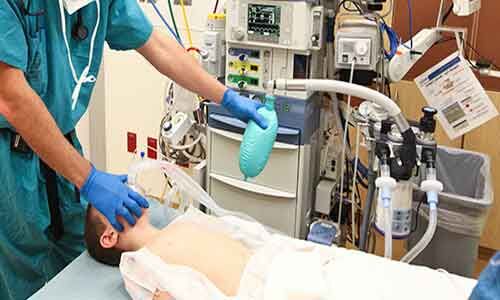- Home
- Medical news & Guidelines
- Anesthesiology
- Cardiology and CTVS
- Critical Care
- Dentistry
- Dermatology
- Diabetes and Endocrinology
- ENT
- Gastroenterology
- Medicine
- Nephrology
- Neurology
- Obstretics-Gynaecology
- Oncology
- Ophthalmology
- Orthopaedics
- Pediatrics-Neonatology
- Psychiatry
- Pulmonology
- Radiology
- Surgery
- Urology
- Laboratory Medicine
- Diet
- Nursing
- Paramedical
- Physiotherapy
- Health news
- Fact Check
- Bone Health Fact Check
- Brain Health Fact Check
- Cancer Related Fact Check
- Child Care Fact Check
- Dental and oral health fact check
- Diabetes and metabolic health fact check
- Diet and Nutrition Fact Check
- Eye and ENT Care Fact Check
- Fitness fact check
- Gut health fact check
- Heart health fact check
- Kidney health fact check
- Medical education fact check
- Men's health fact check
- Respiratory fact check
- Skin and hair care fact check
- Vaccine and Immunization fact check
- Women's health fact check
- AYUSH
- State News
- Andaman and Nicobar Islands
- Andhra Pradesh
- Arunachal Pradesh
- Assam
- Bihar
- Chandigarh
- Chattisgarh
- Dadra and Nagar Haveli
- Daman and Diu
- Delhi
- Goa
- Gujarat
- Haryana
- Himachal Pradesh
- Jammu & Kashmir
- Jharkhand
- Karnataka
- Kerala
- Ladakh
- Lakshadweep
- Madhya Pradesh
- Maharashtra
- Manipur
- Meghalaya
- Mizoram
- Nagaland
- Odisha
- Puducherry
- Punjab
- Rajasthan
- Sikkim
- Tamil Nadu
- Telangana
- Tripura
- Uttar Pradesh
- Uttrakhand
- West Bengal
- Medical Education
- Industry
Dexmedetomidine non-inferior to midazolam for sedation in Mechanically Ventilated Children: Study

According to recent research, it has been found out that there is a non-inferiority of dexmedetomidine compared to midazolam for sedation in children on mechanical ventilation, as published in the Indian Pediatrics Journal.
In children, dexmedetomidine has been reported to be an effective sedative agent without much side effects compared to benzodiazepines or opioids with the additional advantage of reducing the dose of conventional sedative agents. Though use of dexmedetomidine in mechanically ventilated children has increased over last few years, there is wide variation in practice regarding the dose and duration of the drug.
However, few trials that exist, evaluating the efficacy of dexmedetomidine as a sedative agent in mechanically ventilated children, have several limitations. Hence, Krishna Mohan Gulla and colleagues from the Division of Pediatric Pulmonology and Intensive Care, Department of Pediatrics, All India Institute of Medical Sciences, New Delhi, India conducted this noninferiority trial with an objective to compare dexmedetomidine with midazolam for adequacy of sedation in mechanically ventilated children aged 1 month - 15 years.
Secondary objectives were to compare the need for top-up doses of fentanyl and paralytic agents, duration of mechanical ventilation, ICU stay and hospital stay, and adverse events
The authors conducted an open label, non-inferiority, randomized controlled trial among 49 children who were randomized into two groups: 24 to 'midazolam group' and 25 to 'dexmedetomidine group' and the doses were titrated to maintain target sedation score of 4 or 5 as measured by Penn State Children Hospital Sedation algorithm.
The following findings were noted-
- There was no difference in the percentage of time spent in the targeted sedation between the groups [midazolam 67.3% (18.8) vs. dexmedetomidine 56.3 %. (28.6); P=0.12].
- The absolute difference in the percentage of time spent was -10.9% [SE (95% CI) 7.05: (-25.15 to 3.25)].
- The lower end of 95% CI for the difference breached the non-inferiority limit of -20%.
- Number of fentanyl boluses, duration of mechanical ventilation, ICU stay, and hospital stay were similar.
- Four (17.4%) children in dexmedetomidine group developed persistent bradycardia.
Therefore, the authors concluded that "Non-inferiority of dexmedetomidine compared to midazolam for sedation in children on mechanical ventilation could not be established."
Dr. Nandita Mohan is a practicing pediatric dentist with more than 5 years of clinical work experience. Along with this, she is equally interested in keeping herself up to date about the latest developments in the field of medicine and dentistry which is the driving force for her to be in association with Medical Dialogues. She also has her name attached with many publications; both national and international. She has pursued her BDS from Rajiv Gandhi University of Health Sciences, Bangalore and later went to enter her dream specialty (MDS) in the Department of Pedodontics and Preventive Dentistry from Pt. B.D. Sharma University of Health Sciences. Through all the years of experience, her core interest in learning something new has never stopped. She can be contacted at editorial@medicaldialogues.in. Contact no. 011-43720751
Dr Kamal Kant Kohli-MBBS, DTCD- a chest specialist with more than 30 years of practice and a flair for writing clinical articles, Dr Kamal Kant Kohli joined Medical Dialogues as a Chief Editor of Medical News. Besides writing articles, as an editor, he proofreads and verifies all the medical content published on Medical Dialogues including those coming from journals, studies,medical conferences,guidelines etc. Email: drkohli@medicaldialogues.in. Contact no. 011-43720751


